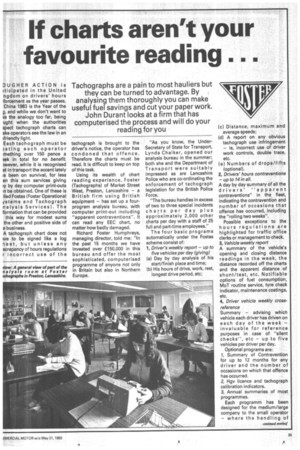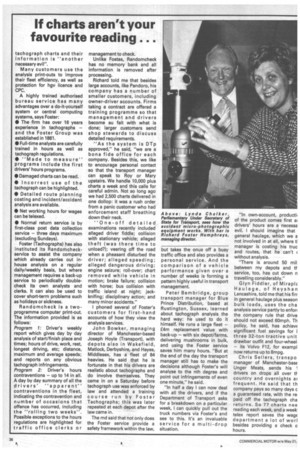If charts aren't your favourite reading . . .
Page 37

Page 38

If you've noticed an error in this article please click here to report it so we can fix it.
Tachographs are a pain to most hauliers but they can be turned to advantage. By analysing them thoroughly you can make useful fuel savings and cut your paper work. John Durant looks at a firm that has computerised the process and will do your reading for you
DUGHER ACTION is iticipated in the United ngdom on drivers' hours rforcement as the year passes. China 1983 is the Year of the g, and while we don't want to ke the analogy too far, being ught when the authorities spect tachograph charts can ake operators seethe law in an rfriendly light.
Each tachograph must be )sting each operator imething over 150 pence a eek in total for no benefit. )wever, while it is recognised at in transport the accent lately is been on survival, for less an this sum services giving w by day computer print-outs in be obtained. One of these is illed Fostas (Foster Operational ystems and Tachograph nalysis Services). The formation that can be provided this way for modest sums the other and positive side of e business.
A tachograph chart does not we to be signed like a log heet, but unless any screpancy of hours regulations r incorrect use of the tachograph is brought to the driver's notice, the operator has condoned that offence. Therefore the charts must be read. It is difficult to keep on top of this task.
Using its wealth of chart reading experience, Foster (Tachographs) of Market Street West, Preston, Lancashire — a British firm using British equipment — has set up a fourprogram analysis bureau, with computer print-out including "apparent contraventions". It can read any EEC chart, no matter how badly damaged.
Richard Foster Humphreys, managing director, told me: "In the past 15 months we have invested over £150,000 in this bureau and offer the most sophisticated, computerised programme of anyone not only in Britain but also in Northern Europe.
"As you know, the UnderSecretary of State for Transport, Lynda Chalker, opened our analysis bureau in the summer; both she and the Department of Transport were suitably impressed as are Lancashire Police who are co-ordinating the enforcement of tachograph legislation for the British Police Force.
"The bureau handles in excess of two to three special incidents charts per day plus approximately 2,000 other charts per day with a staff of 25 full and part-time employees."
The four basic programs automatically under the Fostas scheme consist of:
1, Driver's weekly report — up to five vehicles per day (giving)
(a) Day by day analysis of his start/finish place and time; (b) His hours of drive, work, rest, longest drive period, etc; (c) Distance, maximum and average speeds; (d) A report on any obvious tachograph use infringement — le, incorrect use of driver work controls, double trace, etc.
(e) Numbers of drops/lifts (optional).
2, Drivers' hours contraventions — up to 1410 all.
A day by day summary of all the drivers' "apparent contraventions" in the fleet, indicating the contravention and number of occasions that offence has occurred, including the "rolling two weeks".
Possible exceptions to the hours regulations are highlighted for traffic office clerks or management to check.
3, Vehicle weekly report
A summary of the vehicle's opening and closing distance readings in the week, the distance recorded off the charts and the apparent distance of shunt/test, etc. Notifiable options of fuel consumption, MoT routine service, tyre check indicator, maintenance costings, etc.
4, Driver vehicle weekly cross reference
Summary — advising which vehicle each driver has driven on each day of the week — invaluable for reference purposes in case of "silent checks", etc — up to five vehicles per driver per day.
Optional programs are: 1, Summary of Contravention for up to 12 months for any driver and the number of occasions on which that offence has occurred.
2, Hgv licence and tachograph calibration indicators.
3, Annual summaries of most programmes.
Each programm has been designed for the medium/large company to the small operator — where the handling of tachograph charts and their information is "another necessary evil".
Many customers use the analysis print-outs to improve their fleet efficiency, as well as protection for hgv licence and CPC.
A highly trained authorised bureau service has many advantages over a do-it-yourself system or central computing systems, says Foster: • The firm has over 16 years experience in tachographs — and the Foster Group was established in 1861.
• Full-time analysts are carefully trained in hours as well as tachograph regulations.
• "Made to measure" programs include the first drivers' hours programs.
• Damaged charts can be read.
• Incorrect use of the tachograph can be highlighted.
• Detailed route planning costing and incident/accident analysis are available.
• Net working hours for wages can be telexed.
• Normal return service is by first-class post data collection service — three days maximum (excluding Sundays).
Foster (Tachographs) has also instituted its Randomcheckservice to assist the company which already carries out inhouse analysis on a regular daily/weekly basis, but where management requires a back-up service to periodically doublecheck its own analysts and clerks. It can also be used to cover short-term problems such as holidays or sickness.
Randomcheck is a twoprogramme computer print-out. The information provided is as follows: Program 1: Driver's weekly report which gives day by day analysis of start/finish place and times; hours of drive, work, rest, longest driving, etc; distance, maximum and average speeds; and reports on any obvious tachograph infringements.
Program 2: Driver's hours contraventions — up to 14 in all. A day by day summary of all the drivers' "apparent" contraventions in the fleet, indicating the contravention and number of occasions that offence has occurred, including the "rolling two weeks". Possible exceptions to the hours regulations are highlighted for traffic office clerks or management to check.
Unlike Fostas, Randomcheck has no memory bank and all information is removed after processing.
Richard told me that besides large accounts, like Pandoro, his company has a number of smaller customers, including owner-driver accounts. Firms taking a contract are offered a training programme so that management and drivers become au fait with what is done; larger customers send shop stewards to discuss detailed requirements.
"As the system is DTp approved," he said, "we are a bona fide office for each company. Besides this, we like to encourage personal contact so that the transport manager can speak to Roy or Mary upstairs. We handle 10,000 plus charts a week and this calls for careful admin. Not so long ago we had 2,500 charts delivered in one dollop: it was a rush order from a panic customer who had enforcement staff breathing down their neck.
"One-off detailed examinations recently included alleged driver fiddle; collision with stationary vehicle; alleged theft (was there time to unload?); veering off the road when a pheasant disturbed the driver; alleged speeding; alleged dangerous driving; engine seizure; roll-over; chart removed while vehicle in motion; brake failure; collision with horse; bus collision with traffic island at night; jackknifing; disciplinary action; and many minor accidents."
I phoned several of Foster's customers for first-hand accounts of how they view the analysis services.
John Bowker, managing director of Manchester-based Joseph Hoyle (Transport), with depots also in Wakefield, Matlock, Derbyshire, and Hayes, Middlesex, has a fleet of 84 heavies. He said that he is fortunate in that his drivers are realistic about tachographs and do involve themselves. They came in on a Saturday before tachograph use was enforced by law and attended a training course run by Foster Tachographs; this was later repeated at each depot after the law came in.
The md said that not only does the Foster service provide a safety framework within the law, but takes the onus off a busy traffic office and also provides a personal service. And the comparison of a vehicle performance given over a number of weeks is forming a pattern highly useful in transport management.
Peter Bembridge, group transport manager for Blue Prince Distribution, based at Rustington, Sussex, learned about tachograph analysis the hard way: he used to do it himself. He runs a large fleet — E4m replacement value with back-up — with six depot/farms, delivering mushrooms in bulk, and using the Foster service saves him many hours. "But at the end of the day the transport manager still has to make the decisions although Foster's will analyse to the nth degree and point out infringements of even one minute," he said.
"In half a day I can now deal with all the drivers, and if the Department of Transport asks for a breakdown on a particular week, I can quickly pull out the truck numbers via Foster's and see to this. It's an invaluable service for a multi-drop situation. "In own-account, productii of the product comes first al drivers' hours are a necessa evil. I should imagine that general haulage, which we a not involved in at all, where ti manager is costing his truc and routes, that he can't without analysis.
"There is around 50 mil between my depots and if service, too, has cut down n travelling considerably."
Glyn Fiddler, of Miraplz. Haulage, of Heyshan Lancashire, told me that his firr in general haulage plus season bulk loads, uses the cha analysis service partly to enfon the company rule that drive should not exceed 60mph. Th policy, he said, has achieve significant fuel savings for i three 32-ton tractive unit drawbar outfit and four-wheel — its Volvo F12, for exampl now returns up to 8mpg.
Chris Sellers, transpo manager of Manchester-base Unger Meats, sends his 1 drivers on drops all over It country and overnights at frequent. He said that th company pays so many days c a guaranteed rate, with the re paid off the tachograph cha returns. So 77 charts nee reading each week, and a week telex report saves the wage department a lot of wonl besides providing a check a hours.
























































































































